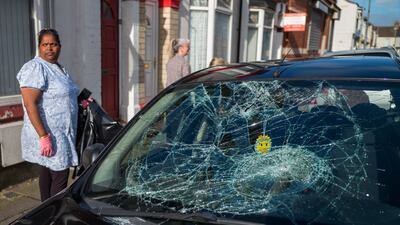I'm tired – exhausted, physically and mentally. And I know I'm not the only one.
People in Britain have lived in the frightening shadow of far-right race riots that have taken place around the country in recent weeks, spurred by misinformation around the identity of a teenager who stabbed to death three young girls in Southport. The angry mobs suspected him to be a Muslim asylum seeker; he is a Cardiff-born child of Rwandan immigrants. In any case, the result has been a wave of anti-immigrant and anti-asylum seeker violence.
Calling themselves “protesters”, the rioters circulated lists of places to gather. One of those was within walking distance of my home. My husband and I notified our employers we would be working from home, and shut ourselves in, as did so many others. Evening came and no “protesters” showed up. Instead, that day streets across Britain were filled with peaceful counterprotests. But bracing for the worst was nonetheless exhausting.
So many people have said they've felt ill since events happened. They’ve been struggling, feeling like their bodies are unresponsive and their minds unable to focus. I’ve certainly felt a sense of paralysis and brain fog.
Of course, the experience of living through these riots in Britain is not at all comparable to the violent conflicts raging in many other parts of the world. But throughout history, riots and pogroms have served as an entry point into that vortex, and my awareness of that fact was heightened during this unrest.
That is because the riots, the fear, the racism, the Islamophobia, the hate, anger and rage these past few weeks, and even in the months and years preceding them all have a common purpose. The American novelist Toni Morrison says the function of racism is “distraction”: “It keeps you from doing your work. It keeps you explaining, over and over again, your reason for being.“
These distractions are there to exhaust people, to make us ill, to dehumanise us, to gaslight us into believing that we are the problem. They force us to constantly justify our existence, leaving little time or energy to explore and develop our talents. A self-perpetuating cycle prompted by the bully – the claim of being less, and then the purposeful hurting to take away opportunity. This struggle to defend our right to exist is exhausting, threatening to extinguish the spark within us.
It did not feel safe “out there” in the streets, but today’s social media and rolling news cycle means that it often does not feel safe “in here” either. The assault of the far right is an assault on the whole of society. But the brunt of that assault is being taken by people from minority ethnic groups and Muslims.
To create some sense of safety to express that heaviness, I was a facilitator for two separate “listening circles”, which are also sometimes known as “safe rooms”. People gathered to speak freely among those experiencing the same, to find community and solidarity.
It was hard to listen, even harder not to reach through the screens of the online sessions to hug and comfort, offer solace and wipe away people’s tears – some of which by the end, trying to hold the heaviness in my heart, were my own.
What felt most hopeless to hear was the sense that – in the words of several speakers – “racism will never go away”.
“We were too comfortable,” someone said, “but it was there all the time."
"People have become emboldened,” said another, “and you can see it was only a veneer of civility... It’s always there and once you know that…”
There was also anger at being dehumanised: “I’m raging, distraught." And the roots of the rage lie in the behaviour of the majority and the state over a long period. Britain’s infamous “hostile environment” immigration policy of a decade ago has trickled down. The rioters have inherited these words.
And there are mixed emotions about what to do next. People expressed a desire and commitment to change, but also a deep frustration that even the work of creating change – sometimes called “emotional labour” falls upon those who are already exhausted. And this is compounded by a perception of a lack of support from industry, businesses and political classes, leading to feelings of alienation and frustration.
But in the rage, despair, exhaustion, hopelessness and even resignation there was also fight and determination. "I don’t want to be the ‘angry black woman’,” said one person, “But I’ll be damned if my children have to deal with this in 10 years."
I am tired. And I'm not the only one.
Yet, despite this exhaustion, we feel a responsibility to act, to do something. But how can we when we must also prioritise self-care and self-preservation? The emotional labour required to tackle these issues is immense, often leaving us too drained to advance ourselves personally or professionally.
We are tired. And we are not the only ones. But as long as racism and Islamophobia persist, we will continue to fight, continue to speak out, and continue to hope for a better future.






















